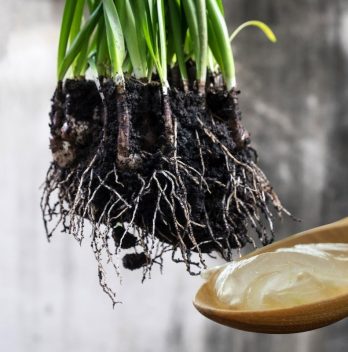Let’s discuss types of rooting hormones. Plants cuttings are easy to propagate. However, for successful propagation, they require a key element known as rooting hormones. Rooting hormones are great to kick start your propagation and they will assist in accelerated root growth.
If you’ve never tried rooting hormone for your cuttings then you’re missing a great deal. Rooting hormone will never have a negative impact on your propagation so there’s no harm in trying it.
We will be looking at the various types of rooting hormones you can use for your cloning. So, let’s dive in and find out the various types of rooting hormones.
What Is Rooting Hormone?
Rooting hormones are gel stimulants which contain natural chemicals for plans and it’s used to signal root growth especially for cuttings. These rooting hormones are produced by plants naturally for root growth. Now scientists have generated a way of synthesizing this hormone in the lab for the use of plant cuttings.
Plants naturally produce hormones for the development of roots and shoots. We have different types of these hormones such as cytokinins, auxins, and gibberellins. The hormone used for rooting is auxins. It is these auxins that stimulate and enhance rooting in plant cuttings.

Although auxins are produced by plants for root development, auxins are also synthesized in the lab. The synthesized auxins are the ones commercially available as rooting hormones and they are generated from plants.
Apart from enhancing root growth, the rooting hormone also maintains a sterile surface for your cuttings. Thus, you also enjoy healthy overall growth.
Plants cuttings rely on rooting hormones or they might not root properly. Hence, it is an essential key for cloning plants.
Types Of Rooting Hormones
There are 3 major types of rooting hormones namely: liquid rooting hormone, gel rooting hormone, and powder rooting hormone.
1. Liquid
The liquid rooting hormone is one of the most common types of rooting hormone. The liquid comes in two types: the concentrated and the standard strength (ready to use). The concentration requires diluting before application. The standard strength can be used right away. Note when making use of the ready-to-use liquid rooting hormone, pour the one to be used in a separate container. Do not insert your cuttings directly into the bottle. This is to prevent contamination. Once it’s in a separate container, dip the stem of your cuttings in the liquid rooting hormone. You can now put your cuttings in your growing medium.
DIP N Grow DG00201 Liquid Hormone Concentrate Rooting Solution, 2-Ounce
2. Gel
Out of the various types of rooting hormone, the gel is the most loved among growers. It is pre-mixed and convenient to use. Simply put the portion you wish to use in a container and insert your cuttings into the gel. The gel will comfortably stick to the cuttings giving the stem a thick coat that serves as protection and they won’t wash away easily. With that, your cuttings are ready to go into your growing medium.
3. Powder
Powder rooting hormone lasts longer as it offers more shelf life. You can make use of the powder for several growing seasons if stored in the right conditions. To use, pour the powder rooting hormone in a separate container to prevent contamination. You can insert the cuttings into the water to encourage the powder to stick to your cuttings. Now insert the wet cuttings into the powder rooting hormone and give it a little shake to take off excess powder. Then it’s ready to go into your growing medium.
Homemade Rooting Hormones
You may be surprised you may have a rooting hormone in your house. Honey is one perfect example of homemade rooting hormone. Although it may not produce quick results as a commercial rooting hormone. You just need to give it a little time to work.
Honey has some naturally occurring rooting hormone. In addition, it offers anti fungi and antiseptic features to protect your cuttings from infection. The gel nature encourages a consistent steam coating that sticks.
FAQ’s
Which is the best rooting hormone?
We are all aware that rooting is necessary in order to achieve a successful plant. But we often wonder what is the best rooting hormone to use. Rooting hormone is a compound that is added to the soil mix and helps the roots to grow and penetrate through the soil.
It is important to understand that there are different types of rooting hormones and they are used in different ways. Rooting hormone is also known as root growth stimulator or root growth promoter. The most common type of rooting hormone is Ipomoea. This is a fast growing plant that can be easily grown indoors. It is not recommended to use Ipomoea when the plants are growing outdoors. You should use it when the plant is in the soil or pot. It is available in different types such as powder, gel and liquid. The powder and gel is available in different concentrations. You can easily dissolve them in water and apply on the root area. The liquid is available in different concentrations and it can be diluted with water and applied on the roots. The powder and gel are easy to use and can be used in both hydroponic and soil based growing systems.
Are there different types of rooting hormone?
There are many types of rooting hormones available on the market, and they all do a job for which they were designed. Rooting hormone has two basic functions. First, it promotes the uptake of nutrients into the root by loosening the soil around the roots. Second, it helps the roots to absorb water.
In the past, the main type of rooting hormone was the so-called “growth hormone,” which was sold as a liquid, or in capsules. Today, most companies sell a combination of growth hormone and a form of calcium that has been shown to be just as effective. When purchasing rooting hormone, always look for one that contains both types of hormone. You can also buy a pre-made combination of growth hormone and calcium in a concentrated form that will dissolve when watered. If you are growing vegetables and flowers indoors, the best thing you can do is to use a product that contains calcium and growth hormone. These products are available from many garden centers and mail-order outlets.
What is a natural rooting hormone?
Rooting hormones, also known as root stimulants or growth stimulants, are chemicals used to promote root development in plants. Rooting hormones are often added to the soil around seedlings and plants to encourage root growth. These chemicals can be organic or synthetic. Organic rooting hormones are made from natural materials, such as plant extracts, and are less toxic than their synthetic counterparts.
Is banana a rooting hormone?
Bananas aren’t really a rooting hormone. They are actually quite high in gibberellic acid (GA), a plant hormone that promotes growth. This is why bananas are often used as houseplants and why you see them in nurseries.
Additional Note On Types Of Rooting Hormones
Growers depend on rooting hormone for propagation cuttings and it has been showing great results ever since. Rooting hormone is a key element that will stimulate the growth of roots to give you a successful propagation and there are various types of rooting hormone to choose from.
Apart from making use of rooting hormone for successful propagation, you should as well take some other important factors into consideration for great results. Things like selecting only cuttings from plants with good traits. Avoid infected plants or plants that have no good quality growth features. This will ensure your cloned plant gives excellent propagation at the end.






